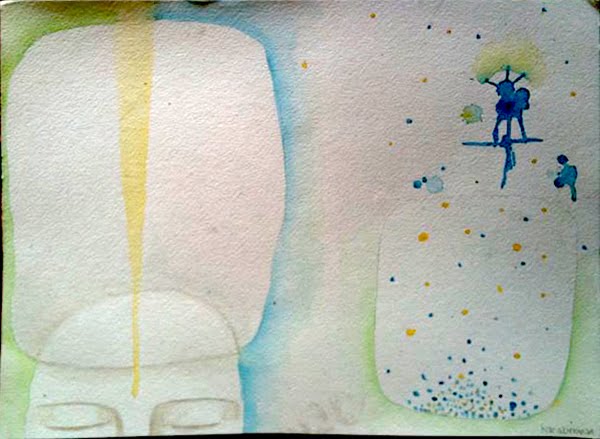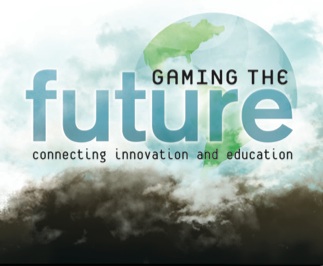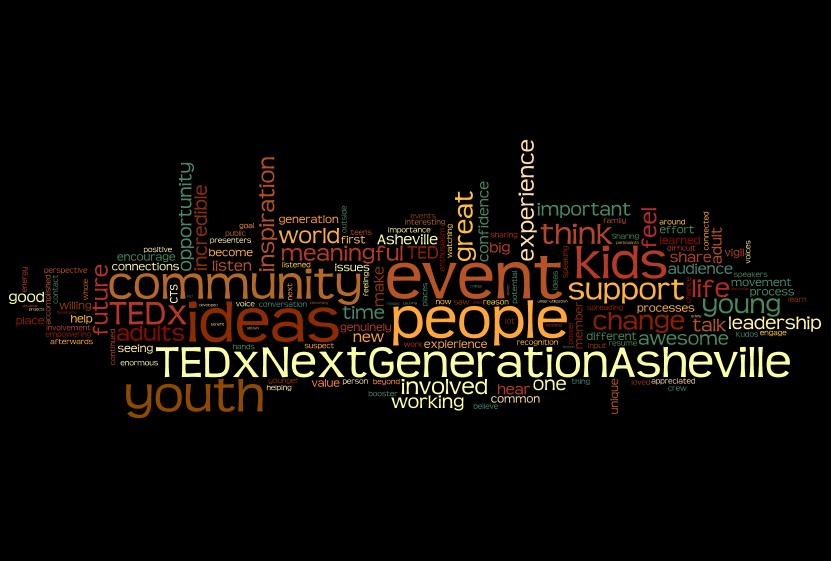This article originally appeared in Fieldnotes
 Tucked away in the small Appalachian community of Burnsville, North Carolina, is a family farm and a place of meeting that has recently become the new home base for Juanita Brown and David Isaacs, Co-Founders of the World Café. Together with Ashley Cooper, a young educator, community organizer, and Executive Director of TEDxNextGenerationAsheville, they are collaborating with Juanita’s 90-year-old mother and younger members from the nearby community to deepen the legacy of the farm for future generations.
Tucked away in the small Appalachian community of Burnsville, North Carolina, is a family farm and a place of meeting that has recently become the new home base for Juanita Brown and David Isaacs, Co-Founders of the World Café. Together with Ashley Cooper, a young educator, community organizer, and Executive Director of TEDxNextGenerationAsheville, they are collaborating with Juanita’s 90-year-old mother and younger members from the nearby community to deepen the legacy of the farm for future generations.
In these “notes from the field,” Ashley and Juanita tell a story that will also be featured in the Innovation Marketplace at the upcoming Summer Institute.
Together for Life from Juanita Brown on Vimeo.
FIELDNOTES: It looks like you’ve made quite a radical change in your life, Juanita. How did you come to be living in the Appalachian mountains?
Juanita: In the early 1970s my parents, Millie and Harold Cowan, civil liberties pioneers from Florida, bought a broken-down 90-acre farm in one of the poorest counties of North Carolina, near Asheville. For the next four decades they worked with others in the community to create a special and welcoming environment for people from all walks of life. After my dad passed away, David and I brought my mom back to the farm and spent the summer here. Late one night, I had an “illumination” in which I felt completely embraced by the love and care that my mom and dad had invested here. In that moment, I realized that we could never sell this farm in our lifetimes—and that David and I had a unique opportunity to discover what wanted to unfold here.
In a purely intuitive leap, we left our home of 35 years in California to “listen the future into being,” and to embody here the principles of multi-generational collaboration that we’d been exploring in our global work with the World Café community. As you know, we’ve co-hosted many multi-generational dialogues since helping to organize the first multi-gen learning program at the Shambhala Institute in 2004. Our farm project is providing a place based learning field for us to deepen into the principles and practices of intergenerational hosting and partnerships. We see this field as having implications for community resilience and for organizations across sectors that are seeking to engage the wisdom and expertise of all of their members in addressing critical challenges.
 FN: And what is the path that brought you into this collaboration, Ashley?
FN: And what is the path that brought you into this collaboration, Ashley?
Ashley: Growing up in Georgia, the Appalachian mountains have always been my “heart home.” The West Coast swept me away for many years, but my return was inevitable. The timing fortuitously aligned with Juanita and David’s decision to move to the region. They have been colleagues, friends, mentors, and co-inspiritors over the years. I embraced the opportunity to learn and co-create with them while at the same time being adopted by a new “grandmother,” Millie!
The nature of this project and this place drew me in—the intergenerational partnerships and the shared dedication to processes of engagement grounded in principles that nourish life, justice, learning and the common good. It is a unique opportunity to be part of a group of passionate people, as we move between our roles as learners, teachers, friends, mentors, and family. At the core, we are living the practice of mutual partnerships where appreciation and respect for each other’s contributions is based on recognizing that each of us has unique gifts to offer, whatever our age or stage of life.
FN: Why is multi-generational collaboration and partnership so important to you both?
Juanita: I have always been fascinated by large-scale systems change and what might enable whole societies to shift into more life-affirming patterns. Over the years I had the great good fortune to have older corporate and community leaders take me under their professional and personal wings as I engaged with this work.
I began to think abut the challenges we face at every level of system today. I realized that there is a huge untapped large-scale social change potential in the wisdom, experience, and perspective of younger leaders as well as children. I began to ask myself: How can we honor and use the unique contributions and gifts that reside in all of us, as a single generation, alive and awake together—whatever our age or stage of life?
Ashley: Young children are my key teachers. I learn from their honest perception of the world, bright curiosity, and playful ways of engaging life. They keep me attuned —reminding me to be in the present moment and inviting me to enthusiastically engage my whole self in the process of living.
At the same time, I’ve been greatly influenced by many older leaders and colleagues in the fields of education, process arts, conversational leadership and therapy. Relationships that bridge the lifespan have provided a strong foundation for my life and work. Youngers shake up my field of vision and invite me to see things from a totally different angle. Elders have acknowledged the value of my contributions and enabled me to stretch into the unknown edges of my capacities with greater confidence as I learn from their experiences, stories and insights.
At this time of global challenge to our common future it seems irresponsible to believe that we can make wise decisions without listening to contributions from all members of the circle of life. The wisdom of multiple generations is desperately needed. I also find life more personally exciting and fun when I am partnering across generations!
 If intergenerational collaborations provide such potential for large-scale social change, why don’t we see more of it?
If intergenerational collaborations provide such potential for large-scale social change, why don’t we see more of it?
Juanita: Collaboration between generations has traditionally looked like grandparents reading to small children, a one-way power dynamic between professional mentors and their younger colleagues, and awkward attempts to manage a next-generation workforce. There are also strong beliefs, held by many, that “youngers are to be seen not heard,” or even that the final decision should always be made by the oldest person in the room. These cultural and societal norms and habits seem to shape so much of our thinking.
Ashley: I can relate to this personally. A colleague once said to me, “I’m older than you, I’m supposed to be wiser than you.” Not everyone will say something that direct, but I often feel that tone of a response, and sometimes it even has more of a dismissive edge. The challenge seems to be our willingness to be humble and genuinely recognize when we are learning. If new understanding is igniting inside of me because of something another person is doing or saying, I am learning from them. They are contributing to my knowing and influencing my actions and decisions. This is a precious gift and we have the opportunity to step beyond traditional boundaries and be open to learn from whoever has the wisdom of the moment to share, regardless of their age or background.
FN: Can you describe how you see your vision for the farm unfolding?
Juanita: We aren’t approaching the visioning process in the traditional manner of creating our preferred picture of the future and driving towards it. More, we are together “listening the future into being.” We are experiencing each of the four seasons and asking ourselves questions such as: What is the story of this farm and its role in the local community? How are we relating to the land and how is the land relating to us? How can we honor and deepen the legacy of my parents and of those who came before? Assuming the farm has its own voice, what is it saying to us? Sensing into the whole, what are the minimum, elegant, next steps?
Ashley: In addition to our own listening and imagining, we are inviting people who visit the farm to share their images of possibility and creative inspirations for this place. We are committed to collective intelligence informing our actions and we trust that this intuitive and collaborative approach will yield paths forward that none of us could have imagined on our own. For example, the local members of our team whose families have lived for generations in this mountain culture have helped us “see” different aspects of this place and its possibilities.
FN: What does this look like right now? How are you spending your days on the farm, Juanita?
Juanita: I´m experiencing the skills and wisdom emanating from the younger members of our team. For example, Justin, age 22, has a unique capacity to find unexpected and innovative solutions to dilemmas related to renovating our 100-year-old barn while keeping its unique character. Not only am I thrilled to learn from him, but the other young carpenter he is working with will often turn to him and ask for his insight. At the same time, when I, as the elder, ask directly for his opinion, I notice that he will sometimes hesitate as I am breaking one of the unspoken cultural rules about relationships between the generations.
Ashley, as a ¨GiGi¨(girl geek!) has become my technical mentor, I am mentoring her in the next stages of her community organizing work, and we are partnering together on this farm project. Another of our team, Thomas Arthur, contributed the short video and photos about the project which accompanies this article, which I could never have imagined! For me, what is unique about these collaborations is that we are each ¨giving it all we´ve got¨ within the context of the cultural and historical factors that have shaped each of our lives.
FN: What have you been learning so far that may have broader organizational, community and societal, implications?
Ashley: We’re discovering that co-mentoring is a more useful construct than traditional mentoring, eldering, or teaching. By being open to fresh perspectives and actively learning from one another’s life experiences and skills, we are accessing leverage points that far exceed our individual capacities.
Juanita: Organizations of all types are facing critical issues as Baby Boomers, now in their 50s and 60s, enter their older years in a world that is dramatically different than the one they have been operating in. Doing it the way we’ve always done it is no longer an option. Younger employees deserve to be considered equal contributors to innovative solutions rather than needing to “wait their turn.” If organizations are to thrive in these uncertain and turbulent times, these new perspectives and redefined partnerships between generations in the workplace are sorely needed.
Elders can enter the legacy stage of their lives by forming alliances with younger leaders around the crucial challenges that not only organizations but also communities are facing today. This will require a new paradigm for all generations and we want to be part of the movement that is responding to this opportunity!

We’d love to hear your reflections and experiences with intergenerational collaboration and learning—in your organizations and in your communities.
Feel free to be in touch with us at:
Ashley: Ashley@easilyamazed.com
Juanita: Juanita@conversationalleadership.com
Juanita Brown, Ashley Cooper and Samantha Tan will be presenting a Skills and Lenses for Innovation session on Multi-Generational Leadership: Shaping Tomorrow Together at the Innovation Marketplace during the ALIA Summer Institute in Columbus in June.
 Whether you’re the CEO of a company, the super mom of a household, or the wide-eyed 7-year old in a room, you know the power of being in a group that plays well together!
Whether you’re the CEO of a company, the super mom of a household, or the wide-eyed 7-year old in a room, you know the power of being in a group that plays well together!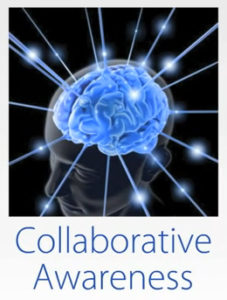 One tool that I’ve been using lately and loving comes from The Center for Collaborative Awareness and is called The State of Grace Document. This is a collaboration process used to establish healthier, more resilient business and personal relationships. It is a practical way to learn more about the people you’re relating with, understanding what makes them tick. It gives you a window into their thoughts, feelings, habits and ways of interacting and allows you the opportunity to specifically desgin your relationship. I’ve found these practices potent for increasing social sensitivity.
One tool that I’ve been using lately and loving comes from The Center for Collaborative Awareness and is called The State of Grace Document. This is a collaboration process used to establish healthier, more resilient business and personal relationships. It is a practical way to learn more about the people you’re relating with, understanding what makes them tick. It gives you a window into their thoughts, feelings, habits and ways of interacting and allows you the opportunity to specifically desgin your relationship. I’ve found these practices potent for increasing social sensitivity.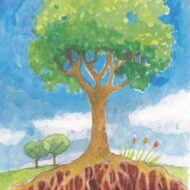


 Tucked away in the small Appalachian community of Burnsville, North Carolina, is a family farm and a place of meeting that has recently become the new home base for Juanita Brown and David Isaacs, Co-Founders of the World Café. Together with Ashley Cooper, a young educator, community organizer, and Executive Director of TEDxNextGenerationAsheville, they are collaborating with Juanita’s 90-year-old mother and younger members from the nearby community to deepen the legacy of the farm for future generations.
Tucked away in the small Appalachian community of Burnsville, North Carolina, is a family farm and a place of meeting that has recently become the new home base for Juanita Brown and David Isaacs, Co-Founders of the World Café. Together with Ashley Cooper, a young educator, community organizer, and Executive Director of TEDxNextGenerationAsheville, they are collaborating with Juanita’s 90-year-old mother and younger members from the nearby community to deepen the legacy of the farm for future generations. FN: And what is the path that brought you into this collaboration, Ashley?
FN: And what is the path that brought you into this collaboration, Ashley? If intergenerational collaborations provide such potential for large-scale social change, why don’t we see more of it?
If intergenerational collaborations provide such potential for large-scale social change, why don’t we see more of it?


